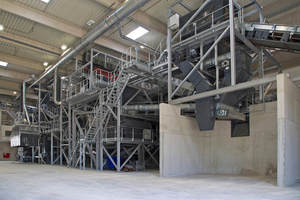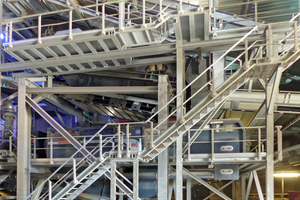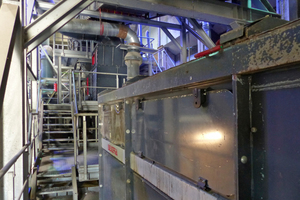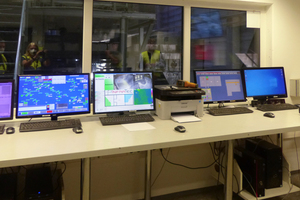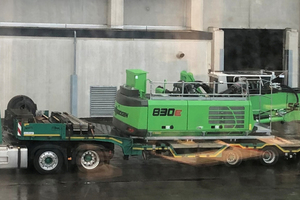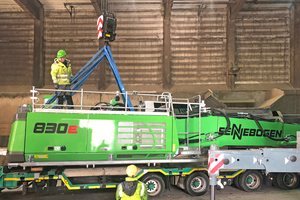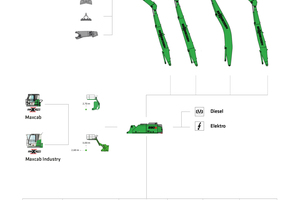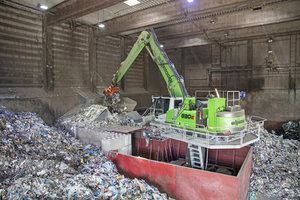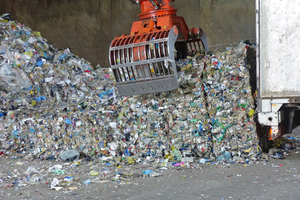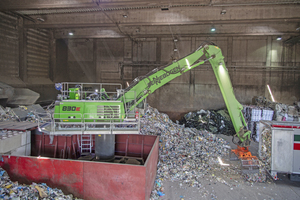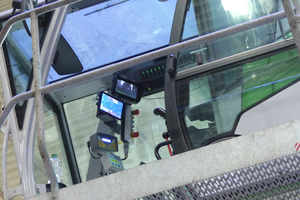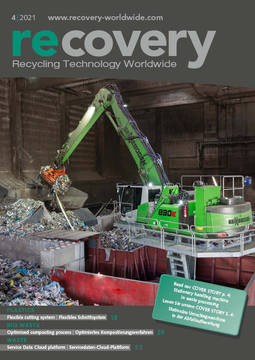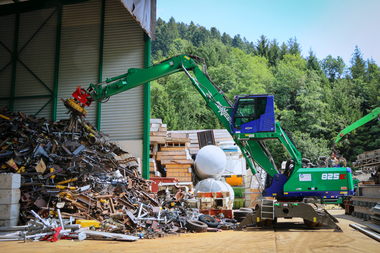Sennebogen 830 E ensures efficiency and sustainability at Albbrennstoff
After an interesting drive through an impressively large cement plant, you arrive at Albbrennstoff GmbH in Allmendingen. Why this close proximity to the cement plant? Albbrennstoff GmbH produces substitute fuel from pre-sorted commercial waste as well as from production waste and leftovers from the dual systems, specifically according to the requirements of SCHWENK Zement, which is then used directly as fuel.
Albbrennstoff receives pre-sorted plastic waste as input material, the largest proportion being leftovers from the dual systems and a certain proportion of pre-sorted commercial and production waste. The input material is then pre-shredded on site using a Lindner pre-shredder. Several overband magnets and an eddy current separator, each from Wagner, remove magnetic as well as non-ferrous metals from the material stream. This is followed by screening with IFE vibrating screens before the material is separated into the heavy/light fractions in the cross-flow and apex shaft classifiers. The cement plant requires that no 3D particles be contained in the fuel (fluff), and the heavy/light separation is used to remove, among other things, the heavier, undesirable 3D particles from the material stream. Subsequently, the pure secondary fuel material is re-shredded with three Lindner re-shredders.
The end product, the so-called fluff, can either be transported directly via a conveyor belt to the cement plant for the rotary kiln or be fed into the company‘s own storage facility. Residual materials that are not suitable for firing the rotary kiln are sent to surrounding cogeneration plants. The Albbrennstoff company has storage capacities for both the incoming raw material and the end product of 3000 t each. Due to the immediate proximity to the cement plant, time as well as energy and transport costs can be saved in the supply of secondary fuels.
Previously, opening, storage, initial, coarse pre-sorting and feeding of the material onto the pre-shredder was carried out using a wheel loader (volume 6 m3). In February 2020, a new handling machine, a Sennebogen 830 E (electric stationary), went into operation. „Energy consumption is now much lower and pre-sorting can be done more accurately,“ Markus Schmucker, production manager at Albbrennstoff, explains the decision to purchase a new handling machine. The Sennebogen excavator takes over opening the incoming bales, pre-distributes and pre-sorts the waste, and loads the pre-shredder. The material then goes on to the processing plant. „This also means that the excavator operator has to be quite precise when pre-sorting,“ Schmucker points out. The Sennebogen 830 E is equipped with a one cubic meter sorting grab. With this compact and precise grab, materials can be presorted much more effectively and contaminants can be sorted out accordingly.
Albbrennstoff GmbH has its own NIR analysis device, so that the material is scanned promptly for moisture, calorific value and chlorine content. The determined data are then fed back into the pre-sorting process. In addition, input and output samples are sent daily to an accredited laboratory. Based on the parameters determined there, the optimal material mix is determined. Important for the purchase decision last year was above all the requirement that it should be a robust and low-maintenance machine, Schmucker emphasizes. The Sennebogen 830 E is equipped with a 132 kW electric motor and is in operation 21 hours a day. By opting for an electric-powered machine, Schmucker expects a 50 % savings in operating costs resulting from lower energy and maintenance costs as well as the longer service life.
Due to the framework conditions, Albbrennstoff decided on a stationary machine, this stands on a 4 point underframe 400 x 400 cm including 10 t ballast. At the customer‘s request, the material handler stands on a 2.5 m tubular pylon separating the upper and lower carriage. This gives the operator a good view over the different sorting segments and into the feed hopper of the pre-shredder. The larger Maxcab industrial cab with sliding door and bulletproof glass is also not a standard design. The slanted windows prevent dirt and dust from settling and provide the machine operator with a better view. The cab can be raised 2.70 m for a good all-round view. With the impressive 14 m long ULM boom, all areas of the hall can be served by the stationary material handler. Thus, the Sennebogen 830 E is used as an all-rounder. „So far, we are very satisfied with the machine and likewise with the service provided by Schlüter Baumaschinen GmbH, the authorized dealer of Sennebogen. The relatively large size of the machine means we can cover everything in the hall with just one machine,“ reports Schmucker.

